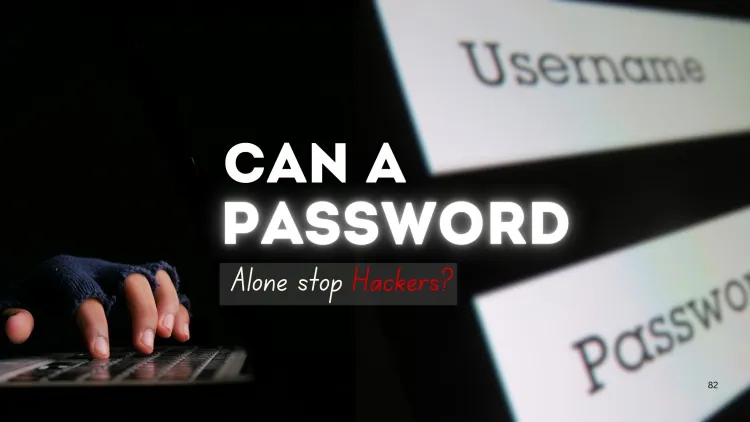Can a Password Alone Stop Hackers? A Comprehensive Guide
While passwords are an essential tool for protecting your accounts and data, they alone cannot prevent hacking. To safeguard against cyber threats, you should use strong, unique passwords, enable multi-factor authentication (MFA), and take additional security measures like encryption and employee training. Combining these strategies will significantly enhance your defense against hackers and secure your digital environment.

Introduction
In the world of cybersecurity, passwords are often the first line of defense against hackers. A good password can prevent unauthorized access to your accounts and sensitive data. However, as technology evolves and hacking techniques become more sophisticated, the question arises: Can a password alone stop hackers?
In this blog, we will dive into how passwords function as a defense mechanism, the strengths and weaknesses of relying solely on passwords, and additional measures that can be taken to further enhance security.
Understanding Password Protection
What Is a Password?
A password is a secret string of characters used to authenticate the identity of a user trying to access an account, system, or network. Passwords can include a combination of letters, numbers, and symbols and are often the first point of security for any account.
How Do Passwords Work?
When you enter a password, the system compares it to the one stored in its database. If the passwords match, access is granted; if they don't, access is denied. While this mechanism is simple, it's highly susceptible to various hacking techniques, such as brute-force attacks, dictionary attacks, and phishing.
Why Passwords Alone Can't Stop Hackers
While passwords are essential, they are not foolproof. Here's why:
1. Weak and Reused Passwords
Many people use weak passwords—simple words or predictable combinations (e.g., "password123"). Additionally, reusing passwords across multiple platforms can expose users to serious risks, especially if one account is compromised.
2. Phishing Attacks
Hackers use phishing tactics to trick users into revealing their passwords. This could involve sending deceptive emails or creating fake websites that look like legitimate login pages to steal credentials.
3. Brute Force and Dictionary Attacks
In a brute-force attack, hackers use automated tools to guess passwords by trying all possible combinations. Similarly, dictionary attacks involve trying common words or phrases that people frequently use as passwords.
4. Password Cracking Tools
There are sophisticated tools that can crack even strong passwords by exploiting vulnerabilities in password hashing algorithms. These tools can sometimes guess complex passwords by taking advantage of poor encryption practices.
Enhancing Password Security
1. Use Strong Passwords
A strong password is one that is long, complex, and unique. It should include uppercase and lowercase letters, numbers, and special characters. Avoid using easily guessable information such as names, birthdates, or common phrases.
2. Enable Multi-Factor Authentication (MFA)
Multi-Factor Authentication (MFA) adds an additional layer of protection by requiring users to provide more than just a password. Typically, this involves entering a one-time code sent via SMS or generated by an app, making it much harder for hackers to gain access.
3. Use Password Managers
Since managing multiple strong passwords can be challenging, consider using a password manager. These tools securely store and generate complex passwords, ensuring you don’t reuse passwords and maintain good security hygiene.
4. Regularly Change Passwords
Regularly updating your passwords can help prevent long-term exposure if an account is breached. Set reminders to change passwords every few months.
Additional Security Measures to Prevent Hacking
1. Encryption
Encrypting sensitive data ensures that even if a hacker intercepts it, they won't be able to read it without the encryption key. Encryption should be applied to data both at rest (stored data) and in transit (data being transmitted).
2. Security Awareness Training
Organizations should educate employees about password hygiene, recognizing phishing attempts, and using strong, unique passwords. Training helps mitigate human errors that often lead to security breaches.
3. Two-Factor Authentication (2FA)
In addition to MFA, Two-Factor Authentication (2FA) requires users to authenticate their identity via two distinct methods, such as something they know (password) and something they have (smartphone or hardware token).
Conclusion
While passwords are a critical component of digital security, they cannot stop hackers on their own. As hacking techniques become more advanced, relying solely on passwords leaves systems vulnerable. To enhance protection, it is essential to combine strong passwords with multi-factor authentication, password managers, and other security measures like encryption and employee training.
By adopting a multi-layered security strategy, individuals and organizations can significantly reduce the risk of a successful hack.
FAQs
1. Can a password completely prevent hackers?
No, passwords alone are not enough to stop hackers. They should be combined with other security measures like multi-factor authentication (MFA) and encryption.
2. What makes a password strong?
A strong password includes a mix of uppercase and lowercase letters, numbers, and special characters. It should be long (at least 12 characters) and not contain easily guessable information.
3. How often should I change my passwords?
It's advisable to change passwords every 60-90 days, especially for sensitive accounts like email or banking.
4. What is multi-factor authentication (MFA)?
MFA requires users to provide two or more verification factors (e.g., password and a one-time code sent to your phone) to access an account, adding extra security.
5. Why should I use a password manager?
A password manager securely stores complex passwords, helping you create strong, unique passwords for every account without having to remember them all.
6. Can hackers guess passwords with brute force?
Yes, hackers use brute-force tools that try all possible combinations. The stronger and longer your password, the harder it is for these attacks to succeed.
7. What is phishing and how does it affect my password?
Phishing is a technique where hackers deceive users into revealing their passwords by pretending to be trustworthy sources, such as banks or websites.
8. Can password cracking tools break strong passwords?
Password cracking tools can break weak passwords, but strong passwords encrypted with modern hashing algorithms are much harder to crack.
9. What should I do if I think my password has been compromised?
Immediately change your password, enable multi-factor authentication (MFA), and monitor your accounts for unusual activity.
10. How do encryption and passwords work together to protect data?
Encryption protects data by converting it into unreadable text. If a hacker intercepts encrypted data, they cannot access it without the decryption key, adding another layer of protection beyond passwords.











![Top 10 Ethical Hackers in the World [2025]](https://www.webasha.com/blog/uploads/images/202408/image_100x75_66c2f983c207b.webp)



![[2025] Top 100+ VAPT Interview Questions and Answers](https://www.webasha.com/blog/uploads/images/image_100x75_6512b1e4b64f7.jpg)







